Throwback Thursday: 10.18.12 Pat Henderson (Football) 1970-74
Oct. 18, 2012
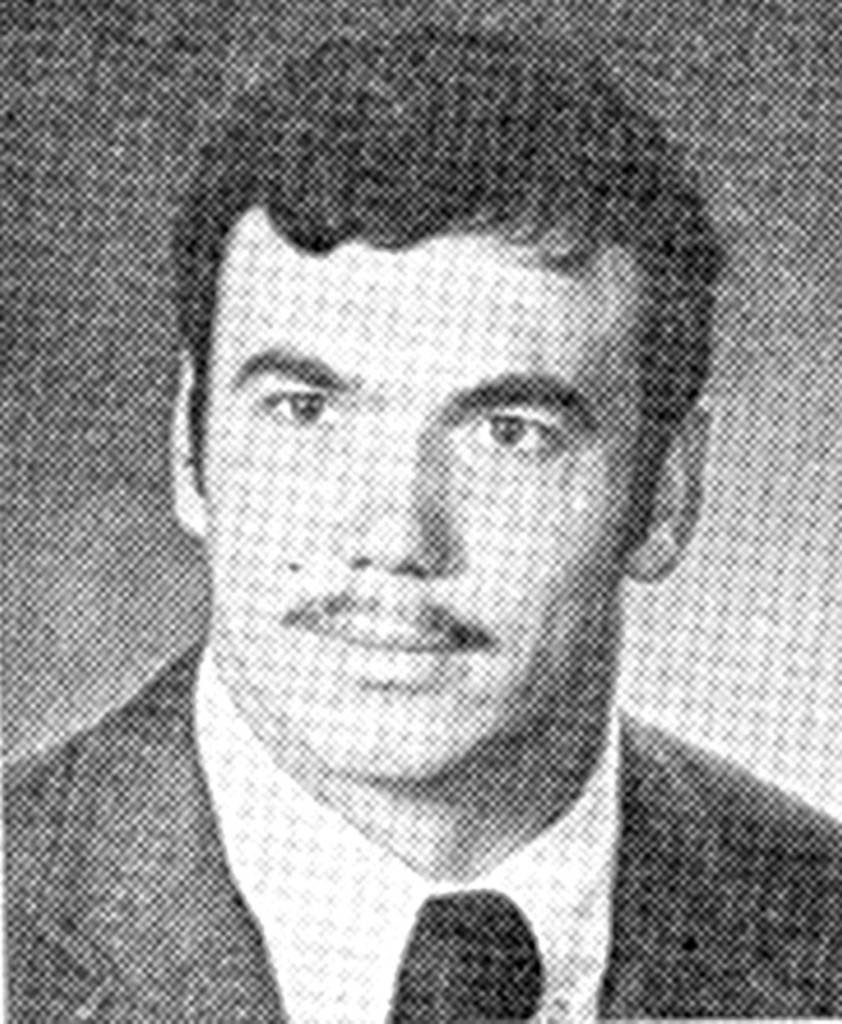 10.18.12 Pat Henderson (Football) 1970-74
10.18.12 Pat Henderson (Football) 1970-74
Even though his playing days ended nearly four decades ago, Pat Henderson continues to play a significant role for the Kansas football program as an assistant athletic director for football relations/traditions.
Henderson, who currently works in the Williams Education Fund office, played under Jayhawk coaching legend Don Fambrough from 1970-74. Shortly after graduating from KU in 1975, he kicked-off what would eventually be an impressive coaching career with his first full-time paid position at Coffeyville Community College.
Over the next three decades, Henderson moved around the country as an assistant coach before returning to Lawrence in 2000 to work under Mark Mangino. He retired from coaching in 2002 after being a part of six conference championships and eight bowl appearances with more than half a dozen Division I programs.
Describe what you do for the Williams Education fund:
“Fundraising. I coached college football for 28 years all over the country and came back, coached football on Mark Mangino’s staff for three years. Then I went into administration in 2005. I wore a lot of different hats–football-relations and then I took over our letterman’s association, K Club. My role has slowly transitioned into full-time fundraising.”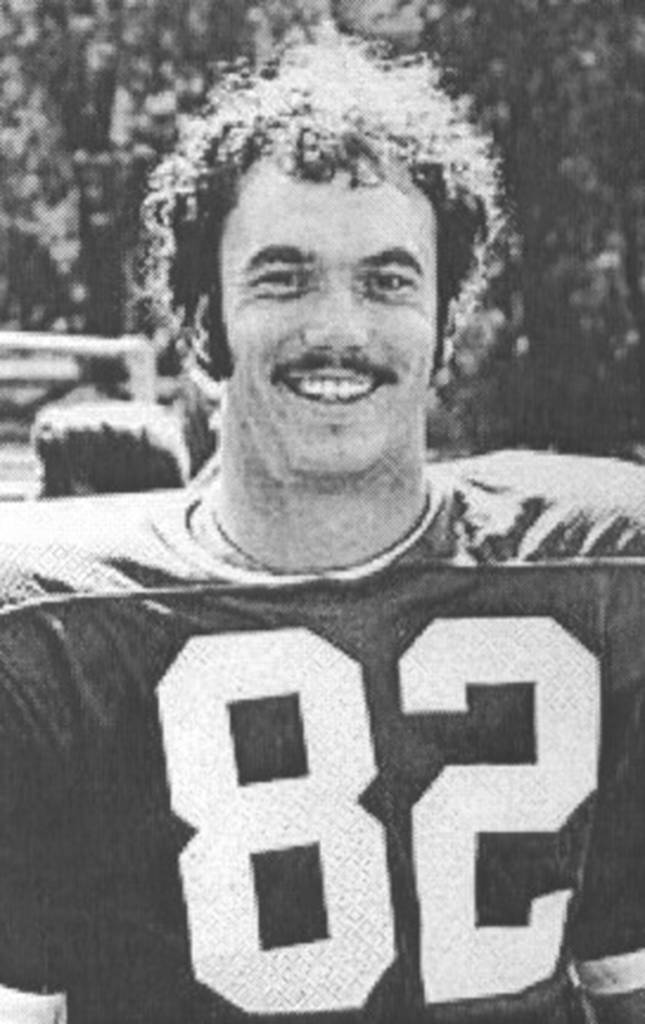
What was your experience like playing football for Don Fambrough?
“I was recruited by Pepper Rogers and I always joked that Coach Rogers saw me practice and that’s when he left. I ended up playing for Coach Fambrough in his first tenure as head coach in the early 1970’s. He was awesome. He was a genuinely good man. He always had a good staff. His door was always open. He would certainly tell you if he didn’t agree with you, but he’s got a tremendous legacy through generations of KU football players. He was awesome to play for.”
Do any particular memories from your playing days stick out in your mind?
“I have lots of memories, but one of them was in my sophomore year. I thought I should be getting more playing time. In those days, it took you a second of courage to go to the head coach’s office, and finally I did. I went in and I said, `Coach, I work hard and I think I do a pretty good job. I keep my nose clean and I think I deserve more playing time.’ He listened and he said, `Pat, you know what? You are a very hard worker. You’re a good kid. You’re going to be able to help this football team.’ Then, he slammed his hand down and said, `I’ll tell you one damn thing. We make that decision, not you. Now, get the hell out of here.’ When I left, all my buddies were waiting and asking, `How’d it go? How’d it go?’ I said, `I don’t know. He said a lot of nice things about me, but I don’t think I’m going to get more playing time.'” (laughs)
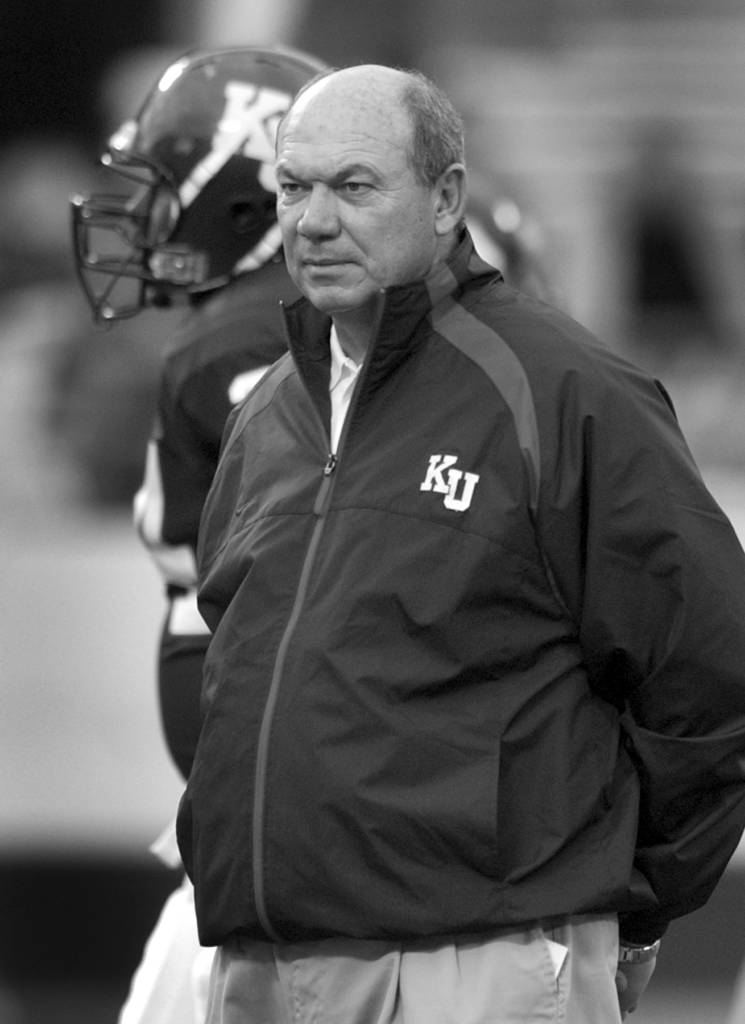 How did you end up in coaching after playing in college?
How did you end up in coaching after playing in college?
“I stayed on as a graduate assistant, as a student assistant, in Coach Fambrough’s last year. Bud Moore came in and I was a GA for him for a year, and a guy named Dick Foster had been the recruiting coordinator and freshman coach. I coached freshman football for one year with Dick Foster. He took the head coaching job at Coffeyville Community College and that was the same time that I was finishing my student teaching and I had several options available. One of them was to go to Coffeyville Community College, which was what I did. Oddly enough, as a coincidence this last Saturday, my first full-time paid coaching job at Coffeyville, with Dick Foster being the head coach–that team was inducted into the Coffeyville (Letterman Club) Hall of Fame. I’m pretty proud of that. So, I went into college coaching. I coached for Dick for three years, and then I went with another former KU player and coach, Sandy Buda, to Nebraska-Omaha. Through those coaching connections. I worked my way up the ladder and coached at Purdue, Arizona State, TCU and SMU and did the stuff like all the coaches do. One of the reasons I got out of coaching was so I didn’t have to worry about making all those moves anymore.”
How did moving around from coaching job to coaching job affect your family?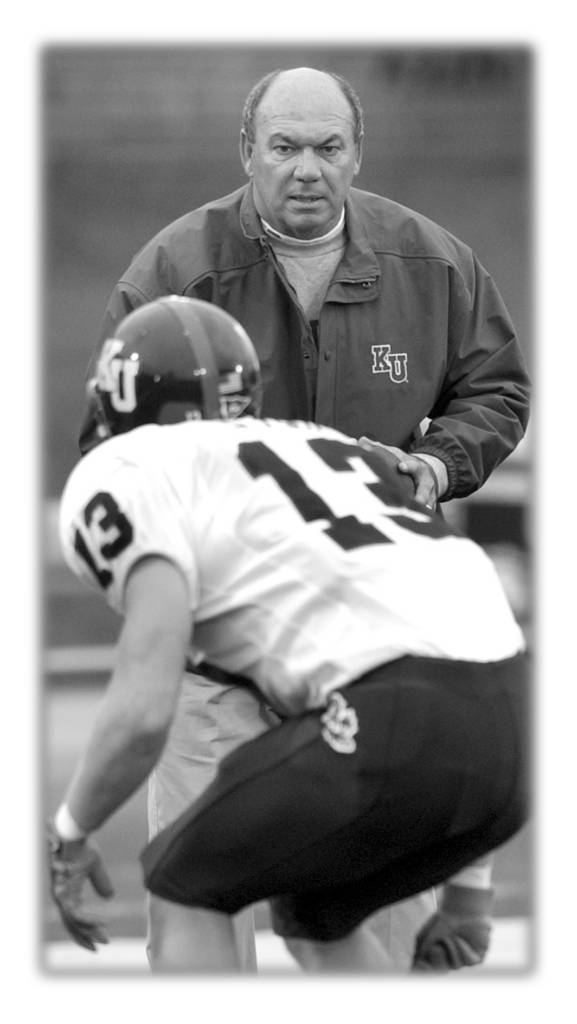
“It’s extremely hard when you’re moving around a lot. Of course, they’re (your family) the ones that suffered with the moves, but we’re very fortunate. One of the things all that moving did for our family was made our family, as a unit, very close. We are a very close family. I have two sons and a daughter, and they would probably rather spend time with each other than they would with any of their best friends. They’re that close. In fairness, for a kid–your dad being a college coach at about any city you’re in–it makes you kind of a big deal by association. We were fortunate enough to go to a lot of bowl games. We beat Michigan in the Rose Bowl when I was at Arizona State and finished fourth in the nation. A lot of our winter vacations were based around bowl games and stuff like that. I’m certain there’s a trade-off.”
What were some of the positives you got out of your coaching experience?
“I grew up a poor kid in Kansas City, and coaches and athletics had a huge impact on my life. I knew at an early age–probably by the time I was a junior in high school–I knew I was going to be a coach. There was never a time where I didn’t think I would be a coach or didn’t want to be a coach. It gives you an opportunity to pass that on to somebody else. You have a chance to impact other kids and make their lives better. You really can make a difference if you do it the right way.”
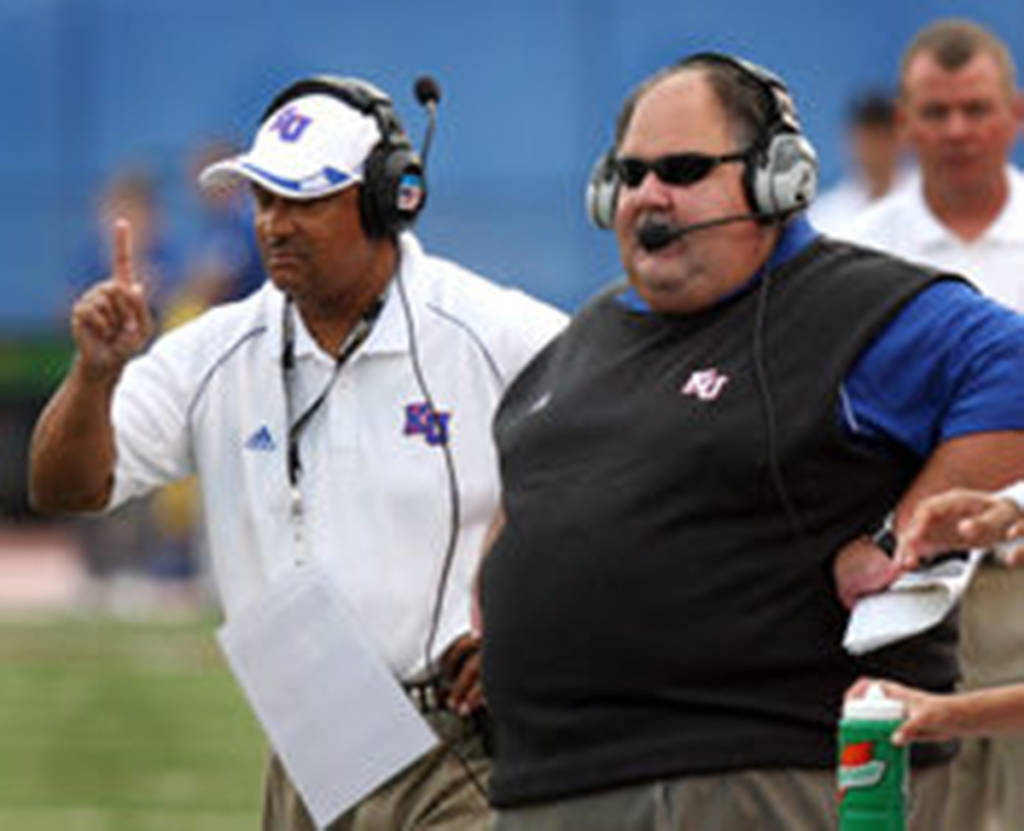 How did you end up back at KU under Mark Mangino? Describe the feeling of that move.
How did you end up back at KU under Mark Mangino? Describe the feeling of that move.
“I was at SMU when Coach Mangino got the job. Through all the moves (made throughout my career) I had a lot of very good friends in college coaching and I’ve coached with a lot of great coaches. I’ve probably been on staffs of at least three NFL head coaches in college, where we worked together and probably 20 NFL coaches all together, and a lot of big-name college coaches. I had a pretty good résumé, and I’ve been fortunate enough to be at a lot of places that were successful. From a timing standpoint, it just felt like time to come back home, so I contacted Coach Mangino. He was in transition, so he had me come up from Dallas to Oklahoma City to meet him and his wife and talk about the job. He said he was going to interview a couple other people and about an hour after I left, he called me and offered me the job. We hit it off pretty well right off the bat and it was just a good time to come home.”
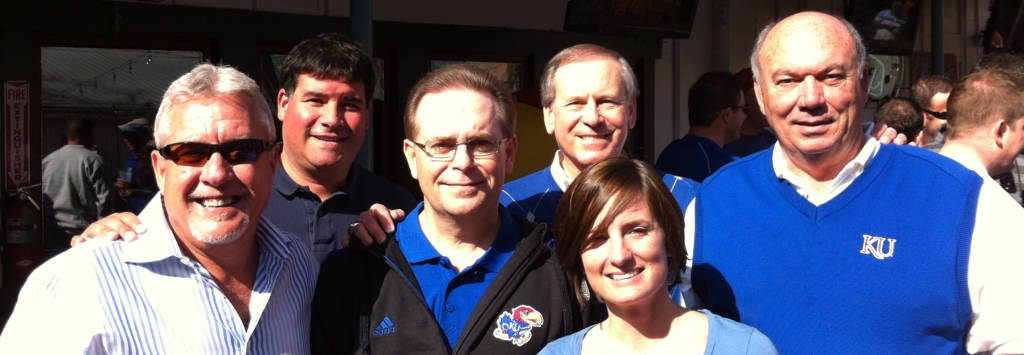 What are some hobbies you enjoy outside of work?
What are some hobbies you enjoy outside of work?
“I like to golf, but I’m not very good at it. I like to fish, and I’d think I like catching them, and I actually kind of like movies. I get into certain genres of movies, but when you’re coaching at this level, you don’t have a whole bunch of hobby time. So really, your hobby becomes your family and I’ve really just taken-up hobbies since I got out of coaching a little bit more.”
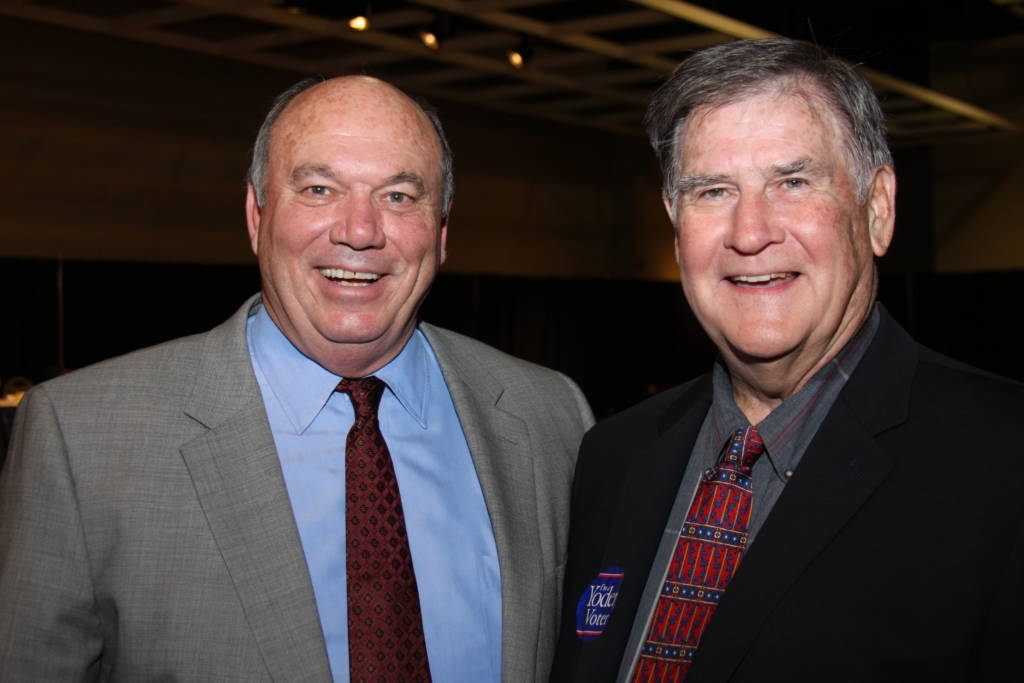 What do you see yourself doing in the future?
What do you see yourself doing in the future?
“Well, retirement (laughs). One thing that’s nice about our athletic department right now is our leader, Sheahon Zenger, and we have a lot of people that are KU people. That’s especially true in the Williams Fund; we’re in it for more than just the job aspect of it. This is our University. This is our athletic department. I think every day, you wake up thinking: A) How lucky am I? and B) How can I help my University and my athletic department? I think there is a personal accountability that’s important in what I do, so my goal is to see us fill Memorial Stadium, have the stadium the way it’s supposed to be and have a winning product on the field. Everything I do is toward that end goal one way or another.”

